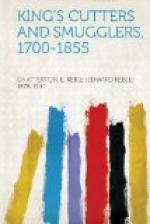[Illustration: “The Badger was hoisting up the galley in the rigging.”]
Meanwhile the Badger was hoisting up the galley in the rigging preparatory to launching, and the crew stood by ready to get in. As soon as the Badger had shot past, down went her helm and she came alongside the Iris as the galley was dropped into the leaden waters. But just at that moment the Badger’s people overheard some men on the lugger exclaim, “Now’s your time,” whereupon the crew of the lugger also launched their boat, forsook the Iris, and began to row off as fast as they could. The Badger called to them—among whom was a man named Albert Hugnet—ordering them under pain of being shot to come alongside the cutter. They replied that they were coming, but that they could not find their thole-pins, saying that they had only two oars on one side and one oar on the other. This was said in English, and was obviously a mere excuse to gain time. Meanwhile the cutter’s galley and men had come alongside the lugger, in which they found 110 half-ankers, containing 382 gallons of brandy, and 157 half-ankers of Geneva, 55 bags of tea, and 19 bags containing 355 lbs. of manufactured tobacco.
As the men of the Iris showed no signs of coming back, the prize-crew on the lugger hailed the Badger, giving information that the smugglers were escaping. “Lie close,” came the command, so the cutter trimmed her sheets and went in pursuit, and fired some shots in the direction of the retreating boat. But it was no use, for the boat was quickly lost from sight among the waves and disappeared entirely. There was some sea on at the time, so no one among the Revenue men envied the Iris’s crew their task of rowing across to Boulogne, a distance of somewhere about twenty-seven miles, in that weather and athwart very strong tides, with the certainty of having a worse time as the Ridens and the neighbourhood of Boulogne was approached. In fact the chief mate of the cutter remarked, some time after, though he had seen these tub-boats go across the sea in all weathers, and were splendidly seaworthy, yet he considered it was not very wise of the Iris’s crew to risk it on such a night as that.
Convinced, then, that the men were making for France, the lugger, with her prize crew on board, presently sailed up after the cutter, hoping to come across their captives. But neither cutter nor lugger could find the men, and concluded, no doubt, that the tub-boat had foundered. But, at a later date, Albert Hugnet was arrested, and in the following June was brought to trial and punished. It then came out that the whole boat-load had escaped with their lives. For Andres Finshaw was called as evidence for the defence. He had been one of the lugger’s crew, and showed that after rowing away that night they had not fetched across to the French coast, but having the good luck to find a French fishing-craft only a quarter of a mile away, they were taken aboard her and thus returned to France.




